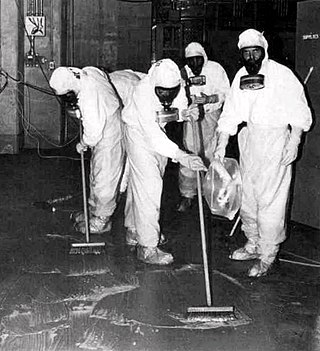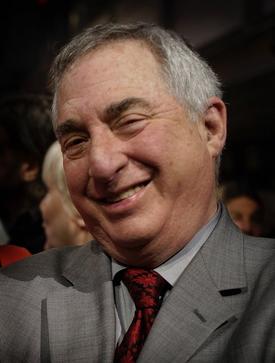
The Nuclear Regulatory Commission (NRC) is an independent agency of the United States government tasked with protecting public health and safety related to nuclear energy. Established by the Energy Reorganization Act of 1974, the NRC began operations on January 19, 1975, as one of two successor agencies to the United States Atomic Energy Commission. Its functions include overseeing reactor safety and security, administering reactor licensing and renewal, licensing radioactive materials, radionuclide safety, and managing the storage, security, recycling, and disposal of spent fuel.

The Pulitzer Prize for Investigative Reporting has been awarded since 1953, under one name or another, for a distinguished example of investigative reporting by an individual or team, presented as a single article or series in a U.S. news publication. It is administered by the Columbia University Graduate School of Journalism in New York City.

The Pulitzer Prize for Feature Writing is one of the fourteen American Pulitzer Prizes that are annually awarded for Journalism. It has been awarded since 1979 for a distinguished example of feature writing giving prime consideration to high literary quality and originality.

The Duane Arnold Energy Center (DAEC) was Iowa's only nuclear power plant. It is located on a 500-acre (200 ha) site on the west bank of the Cedar River, two miles (3.2 km) north-northeast of Palo, Iowa, USA, or eight miles (13 km) northwest of Cedar Rapids.

The Pulitzer Prizes for 1980 were announced on April 14, 1980. A total of 1,550 entries were submitted for prizes in 19 categories of journalism and the arts. Winners were chosen by the 16-member Pulitzer Prize Board, presided over by Clayton Kirkpatrick. For the first time in the Prizes' history, finalists were announced in addition to the winners.
Larry C. Price is an American photojournalist who has won two Pulitzer Prizes. In 1981, he won the Pulitzer Prize in Spot News Photography, recognizing images from Liberia published by the Fort Worth Star-Telegram. In 1985, he won the Pulitzer Prize for Feature Photography for images from war-torn Angola and El Salvador published by The Philadelphia Inquirer.
Donald L. Barlett is an American investigative journalist and author who often collaborates with James B. Steele. According to The Washington Journalism Review, they were a better investigative reporting team than even Bob Woodward and Carl Bernstein. Together they have won two Pulitzer Prizes, two National Magazine Awards and six George Polk Awards. In addition, they have been recognized by their peers with awards from Investigative Reporters and Editors on five separate occasions. They are known for their reporting technique of delving deep into documents and then, after what could be a long investigative period, interviewing the necessary sources. The duo has been working together for over 40 years and is frequently referred to as Barlett and Steele.
James B. Steele is an American investigative journalist and author. With longtime collaborator Donald L. Barlett he has won two Pulitzer Prizes, two National Magazine Awards, six George Polk Awards and many other national awards during the 40 years they worked together at The Philadelphia Inquirer, Time, and Vanity Fair.
Henry Southworth Allen is an American Pulitzer Prize-winning critic, journalist, poet, and artist.

Nuclear safety in the United States is governed by federal regulations issued by the Nuclear Regulatory Commission (NRC). The NRC regulates all nuclear plants and materials in the United States except for nuclear plants and materials controlled by the U.S. government, as well those powering naval vessels.

Joseph Mallam Hendrie is a former chairman of the U.S. Nuclear Regulatory Commission (NRC). On August 9, 1977 he was named to a four-year term on the Commission and designated as its chairman by President Jimmy Carter. From 1975 to 1977, Hendrie had served as chairman of the Department of Applied Science at Brookhaven National Laboratory.

The international reaction to the 2011 Fukushima Daiichi nuclear disaster has been diverse and widespread. Many inter-governmental agencies responded to the Japanese Fukushima Daiichi nuclear disaster, often on an ad hoc basis. Responders included International Atomic Energy Agency, World Meteorological Organization and the Preparatory Commission for the Comprehensive Nuclear Test Ban Treaty Organization, which has radiation detection equipment deployed around the world.
Gary Cohn is an American Pulitzer Prize-winning investigative reporter and adjunct professor at the University of Southern California Annenberg School for Communication and Journalism.
David A. Lochbaum was the Director of the Nuclear Safety Project for the Union of Concerned Scientists (UCS). A nuclear engineer by training, he worked in nuclear power plants for nearly two decades. Lochbaum has written numerous articles and reports on various aspects of nuclear safety and published two books.
Edwin S. Lyman is a physicist and the Director of Nuclear Power Safety with the Union of Concerned Scientists (UCS). He specializes in nuclear proliferation, nuclear terrorism, and nuclear power safety.

Inga Saffron is an American journalist and architecture critic. She won the 2014 Pulitzer Prize for Criticism while writing for The Philadelphia Inquirer.

Andrew Jay Schneider was an American journalist and investigative reporter who worked for the Pittsburgh Press and Seattle Post-Intelligencer as a public-health reporter. He received back-to-back Pulitzer Prizes while working for the Press: one in Specialized Reporting in 1986 with Mary Pat Flaherty, and another for Public Service with Matthew Brelis and the Press in 1987. Schneider also co-authored a book about an asbestos contamination incident in Libby, Montana, entitled "An Air That Kills".

Martin Fackler is an American journalist and author. He has worked for more than two decades as a foreign correspondent in Japan and China, including six years as Tokyo bureau chief for The New York Times. In 2012, his team was named as finalist for the Pulitzer Prize in International Reporting for its investigative coverage of the March 2011 Fukushima Daiichi nuclear disaster. He has written or co-written eleven books in Japanese, including the best-seller Credibility Lost: The Crisis in Japanese Newspaper Journalism After Fukushima.
William John Woestendiek Jr. was an American journalist and author. He was awarded a Pulitzer Prize for Investigative Reporting in 1987 for articles "which included proving the innocence of a man convicted of murder". After retiring from journalism, he started a blog, Ohmidog!, which focused on the relationships between people and their canine companions. Woestendiek wrote two non-fiction books: Dog, Inc.: The Uncanny Story of Cloning Man’s Best Friend and Travels With Ace.









